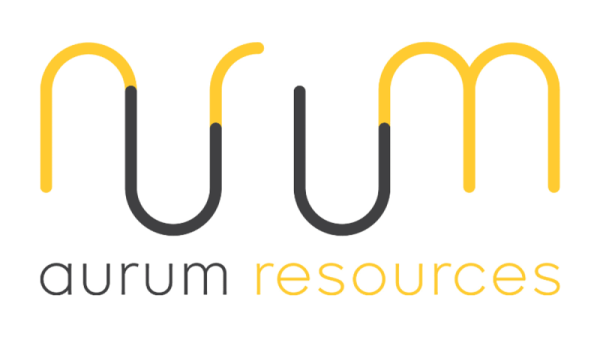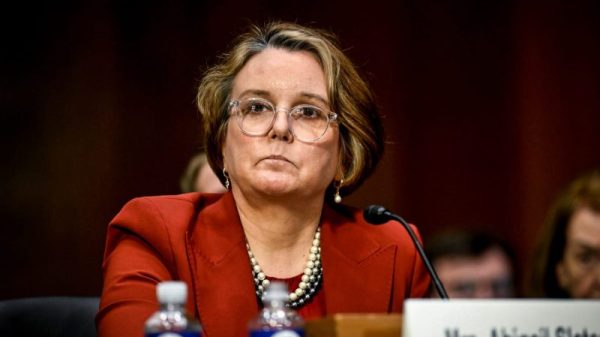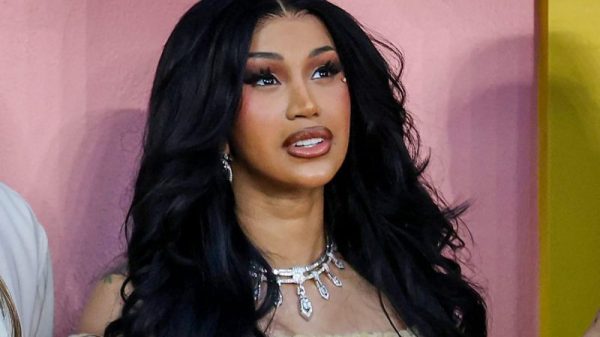HANOI — President Biden was given an enthusiastic welcome in Vietnam on Sunday, as he drove past Ho Chi Minh’s expansive mausoleum and eventually to the Communist Party headquarters, where he and General Secretary Nguyen Phu Trong solidified a new diplomatic arrangement that will enhance ties between the two countries in the face of China’s influence.
But at a late-night news conference, Biden sought to emphasize that despite bolstering America’s alliance with Vietnam, Japan, South Korea and other countries on China’s periphery, he was not seeking to “isolate” or “hurt” Beijing.
“Really, what this trip was about — it was less about containing China. I don’t want to contain China,” he said. “I just want to make sure we have a relationship with China that is on the up and up, squared away.”
“I want to see China succeed economically,” Biden added. “But I want them to succeed by the rules.”
In Hanoi, the mood was warm as Trong effusively praised Biden and the chance to improve cooperation. He also referenced a meeting they had some eight years ago in Washington, seeming to indirectly swat back at comments over Biden’s age.
“You have nary aged a day and I would say you look even better than before,” Trong said. “Every feature of you, Mr. President, is very much complementary of your image.”
Biden laughed in appreciation, later quoting Irish poets and highlighting the need for the countries to coordinate on a range of issues, saying, “This can be the beginning of even a greater era of cooperation.”
“I think we have an enormous opportunity,” Biden said. “Vietnam and the United States are critical partners at what I would argue is a very critical time. I’m not saying that to be polite. I’m saying it because I mean it from the bottom of my heart.”
The meeting marked a significant moment as Biden attempts to draw Vietnam closer as part of a continued mobilization of countries in the Pacific that can provide a counterweight to China’s rise. Vietnam plays an especially crucial role, given that it shares a border with China.
Biden, who has not spoken with Chinese leader Xi Jinping since they met in November 2022 during the Group of 20 summit in Bali, Indonesia, said that while his Cabinet members have been meeting with their Chinese counterparts, he would like to have more direct contact with Xi.
“It’s not like there’s a crisis if I don’t personally speak to him. It’d be better if I did,” he said. “But I think, look, this is not a criticism, it’s an observation: He has his hands full right now. He has an overwhelming unemployment with his youth. One of the major economic tenets of his plan isn’t working at all right now. I’m not happy for him, but it’s not working. So he’s trying to figure out … what to do about the particular crisis they’re having now.”
The meeting between Biden and Trong earlier in the day took place in a wood-paneled conference room, with a statue of Ho Chi Minh, a central figure in the Vietnam War who led North Vietnam in its battle against the United States, looking on from the side. Those sitting near Biden included Secretary of State Antony Blinken and special climate envoy John F. Kerry, whose political career was marked by his service in the Vietnam War and then his opposition to it.
The 24-hour stop here — which follows Biden’s trip to New Delhi to attend the G-20 summit — also marked the first time that Biden, who has visited dozens of nations and whose generation was bitterly divided by the Vietnam War, set foot in the country. He didn’t serve in the war and was never part of the protest movement, saying at one point: “I wore sports coats. … I’m not big on flak jackets and tie-dyed shirts.”
But he is also, in some ways, bringing the United States closer than ever before to Vietnam, with the announcement of a comprehensive strategic partnership that will link the countries diplomatically to a greater extent.
“This is Vietnam’s highest tier of international partnership. It’s important to make this more than words,” Jon Finer, the deputy national security adviser, told reporters on Air Force One. “In a system like Vietnam, it’s a signal to the entire government, to their entire bureaucracy, about the depth of cooperation and alignment with another country.”
“Vietnam is a critical relationship of the United States, and we will be deepening that relationship,” he added.
Emerging from their meeting, Trong said that the U.S.-Vietnam partnership had grown by “leaps and bounds” and that it was “elevated to a new height.” He proclaimed that his country was “a friend, a reliable partner and a responsible member of the international community.”
“Vietnam will continue to strengthen its ties to the U.S. and other international partners in the spirit of Ho Chi Minh after Vietnam achieved its independence,” he said.
Biden referred to an evolving relationship since the war, and suggested that the countries were overcoming “the pain of the past.”
He referenced Kerry as well as the late senator John McCain, saying, “Both men saw so clearly, as I and so many others did, how much we had to gain by working together to overcome a bitter past.”
Kerry is expected to join Biden on Monday for a visit to the site where McCain was held as a prisoner of war.
Biden’s visit underlines the priority he has put on assembling an alliance to push back against China economically, diplomatically and militarily. Human rights groups have condemned the Communist Party of Vietnam for its treatment of its citizens, estimating that the government currently has about 200 political prisoners.
The State Department has previously acknowledged credible reports of the government imprisoning, torturing and killing activists under a corrupt judiciary that has invaded privacy and restricted freedom of the press, religion and assembly.
After their meeting, Trong said it was important to not interfere in domestic affairs, while Biden said, “I also raised human rights as a priority for both my administration and the American people.”
Responding to a shouted question about whether human rights were a part of his conversations here, he stopped and said, “I raised it with every person I met.”
Advocates have called on the Biden administration to demand concessions from the government before upgrading diplomatic relations, a plea echoed Friday by five members of the congressional Vietnam Caucus. Representatives wrote to Biden ahead of his visit, calling on the administration to demand the release of prisoners of conscience, a moratorium on arrests of human rights advocates, and amnesty for political prisoners before he makes any arms deal with Vietnam.
“It’s outrageous that President Biden has chosen to upgrade diplomatic ties with Vietnam at a time when the one-party state is in the middle of a brutal crackdown on activism, dissent, and civil society,” Ben Swanton, co-director of the 88 Project, a U.S.-based human rights organization focused on Vietnam, said in a statement.
Biden began the day in New Delhi, gathering with some of the world’s top leaders at a memorial site for Mohandas K. Gandhi, one of history’s foremost independence figures, known for espousing nonviolent resistance, at a time when the world’s richest nations are consumed by debate over Russia’s ongoing invasion of Ukraine.
He and other leaders in the G-20 greeted Indian Prime Minister Narendra Modi. They removed their shoes or donned slippers and approached the memorial, which was covered with yellow, orange and white flowers and an eternal flame in the middle to mark the site where the leader — who was popularly known as Mahatma — was cremated following his assassination in 1948.
On a rainy and humid morning, the leaders observed a moment of silence and listened to Gandhi’s favorite hymns before leaving wreaths in his honor. The group walked around the site but offered no public remarks.
Biden’s departure from New Delhi concluded his participation over the past two days at the G-20 summit, while some leaders continued to meet for a luncheon and an afternoon session.
Biden and other world leaders on Saturday afternoon announced plans for a new rail and shipping corridor that would connect India and Europe through the Middle East, an ambitious proposal aimed at further connecting a volatile region and countering China’s years-long backing of massive infrastructure projects around the world.
The leaders also reached consensus on a 37-page joint declaration on 83 points, several of which referred to Russia’s war in Ukraine but in weaker terms than they agreed to a year earlier during the G-20 gathering in Bali. In the weeks leading up to the summit, it seemed possible that the group — whose members include Russia and China, although their leaders did not attend — would fail to agree on a joint statement for the first time in its history.
In a Facebook post, Ukrainian Foreign Ministry spokesman Oleg Nikolenko said the G-20 has “nothing to be proud of” in regard to its language on Russian aggression in Ukraine, and he offered his own edits of how the portions regarding Ukraine should have been written.
Finer defended the language Sunday, saying it did not indicate any move away from support for Ukraine.
“The statement is a major step forward in this effort, highlighting the major economies of around the world — including, by the way, Brazil, India, South Africa — are united on the need to uphold international law and for Russia to respect international law,” he said.
The declaration, which addressed a range of other issues including climate change, did help to demonstrate that the alliance of the world’s top economic powers could still find some consensus.
Biden came to the conference determined to try to showcase that the G-20 can maintain its relevance, particularly after Xi and Russian President Vladimir Putin sent deputies instead of attending themselves amid tensions over the war in Ukraine.
Asked whether Xi’s absence affected the summit, Biden said on Saturday, “It would be nice to have him here but, no, the summit is going well.”
Finer said that during the summit, Biden had “brief greetings” with Mohammed bin Salman, the crown prince of Saudi Arabia, but they did not have time for a “more substantive conversation.”
Biden is slated to depart Vietnam on Monday, with plans to mark the anniversary of the Sept. 11, 2001, terrorist attacks during a refueling stop at a military base in Alaska. He is planning to meet with members of the military and deliver remarks.
He will then return to Washington after a whirlwind four-day trip that circumnavigated the globe.
“I tell you what,” he said at the end of his news conference. “I don’t know about you, but I’m going to go to bed.”



























